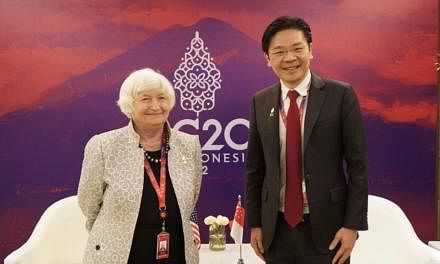GENEVA (REUTERS) - The World Health Organisation's emergencies director, Mike Ryan, said on Friday (Dec 3) there was no evidence to support a change in Covid-19 vaccines to tailor them to the Omicron variant.
Mr Ryan, speaking at a social media event, said that if needed, however, the work was already under way in case Omicron-specific vaccines were needed.
"Right now, we have highly effective vaccines that are working. We need to focus on getting them more equitably distributed. We need to focus on getting people most at risk vaccinated," Mr Ryan said.
The agency said earlier on Friday that it was still studying the transmissibility and severity of the new variant.
Makers of Covid-19 vaccines are to be commended for planning for the "likelihood" of needing to adjust their products to offer protection against the Omicron variant, a WHO spokesman said on Friday.
Mr Christian Lindmeier said the agency was studying the transmissibility and severity of the variant first detected in southern Africa last month.
Mr Lindmeier, correcting remarks made earlier to a UN briefing in Geneva, said it was "commendable" that vaccine manufacturers start "planning ahead and plan for the likelihood for having to adjust the existing vaccine".
"That's good not just to wait until the final alarm bell rings," he said.
Germany's BioNTech should be able to adapt its coronavirus vaccine relatively quickly in response to the emergence of the Omicron variant, its CEO Ugur Sahin told the Reuters Next conference on Friday.
South African scientists studying the Omicron outbreak believe symptoms are less severe for those reinfected with Covid-19 by the new variant or infected after vaccination, a top scientist said on Thursday.
Dr Maria van Kerkhove, the WHO's technical lead on Covid-19, said on Wednesday that the body expected to have more information on the transmissibility of the new Omicron variant"within days".
"It will still take some time and let's not rush into conclusions here," Mr Lindmeier said on Friday.
"Preliminary data, and we have said that now since awhile, show that there is higher transmissibility. But that's all that we basically have so far," he said.
Delta remains the dominant variant globally, accounting for more than 90 per cent of infections, Mr Lindmeier said.
"So Omicron may be on the rise, and we may come to a point where it takes over to be the dominant variant, but at this point the very dominant variant remains Delta," he said.
"The restrictions that were put into place in many countries just two weeks ago, economic closures again, lockdowns in some areas, closure of Christmas markets in parts of Europe, this was done before Omicron because of a rise in Delta cases. Let's not lose sight of this," he added.







